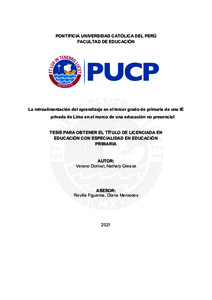| dc.contributor.advisor | Revilla Figueroa, Diana Mercedes | |
| dc.contributor.author | Verano Dorival, Nathaly Greace | |
| dc.date.accessioned | 2021-03-30T15:33:59Z | |
| dc.date.available | 2021-03-30T15:33:59Z | |
| dc.date.created | 2021 | |
| dc.date.issued | 2021-03-30 | |
| dc.identifier.uri | http://hdl.handle.net/20.500.12404/18696 | |
| dc.description.abstract | Como parte de la evaluación formativa, la retroalimentación resulta un elemento vital
pues le brinda sentido a este enfoque de evaluación. A partir de ella, los docentes comunican
a los estudiantes sus logros y aquello que pueden mejorar, tomando como referencia una
meta de aprendizaje previamente establecida. La retroalimentación permite que los alumnos
lleven un control sobre su propio proceso de aprendizaje, habilidad que resulta indispensable
en una educación no presencial. Para ello, además de informar, la retroalimentación implica
brindar oportunidades para que los estudiantes apliquen las recomendaciones recibidas. El
objetivo de la investigación es describir el proceso de retroalimentación del aprendizaje
empleado por una docente de tercer grado de primaria de una IE privada de Lima en el marco
de una educación no presencial. Para ello, los objetivos específicos están enfocados en
identificar los momentos, reconocer los medios y determinar los tipos de retroalimentación que
emplea esta maestra, siguiendo los aportes teóricos de Hattie y Timperley (2007) y Anijovich
(2019). La investigación es cualitativa y de nivel descriptivo. Asimismo, para recabar la
información se entrevista a una docente y se observa 4 sesiones de clase del área de
Comunicación y Matemática. Uno de los hallazgos más significativos del estudio es que la
docente desarrolla la retroalimentación constantemente enfocándose en revisar todas las
actividades evaluativas. También se recalca el valor que la maestra le otorga a la
retroalimentación inmediata, siendo esta crucial en una educación no presencial. Asimismo,
se destaca la variedad de tipos de retroalimentación y medios empleados por la profesora. | es_ES |
| dc.description.abstract | As part of formative assessment, feedback is a vital element, since it gives meaning to
this assessment approach. Based on feedback, teachers are able to communicate to students
about everything they have achieved and what they can improve, taking as a reference a
previously established learning goal. Also, because of feedback, students have the opportunity
to monitor their own learning process. To this end, it is essential to clarify that beyond providing
information, feedback implies providing the necessary opportunities for students to apply the
recommendations received. The aim of the research is to describe the feedback used by a
third-grade primary school teacher from a private school of Lima in a distance education
context. To do this, the thesis is focused on identifying the moments, recognizing the means
and determining the types of feedback, following the theoretical contributions of Hattie and
Timperley (2007) and Anijovich (2019). This research is qualitative and has a descriptive level.
Likewise, to collect the information, one teacher was interviewed and 4 Maths and Spanish
lessons were observed. One of the most significant findings of the study is that the teacher
develops feedback permanently, focusing on reviewing all the activities that children do. The
value that the teacher gives to immediate feedback is also emphasized, because this is
essential in a distance education. Likewise, the variety of types of feedback and means used
by the tutor are highlighted. | es_ES |
| dc.language.iso | spa | es_ES |
| dc.publisher | Pontificia Universidad Católica del Perú | es_ES |
| dc.rights | info:eu-repo/semantics/openAccess | es_ES |
| dc.rights.uri | http://creativecommons.org/licenses/by-sa/2.5/pe/ | * |
| dc.subject | Aprendizaje (Educación) | es_ES |
| dc.subject | Educación a distancia | es_ES |
| dc.subject | Educación primaria--Investigaciones | es_ES |
| dc.title | La retroalimentación del aprendizaje en el tercer grado de primaria de una IE privada de Lima en el marco de una educación no presencial | es_ES |
| dc.type | info:eu-repo/semantics/bachelorThesis | es_ES |
| thesis.degree.name | Licenciado en Educación con especialidad en Educación Primaria | es_ES |
| thesis.degree.level | Título Profesional | es_ES |
| thesis.degree.grantor | Pontificia Universidad Católica del Perú. Facultad de Educación | es_ES |
| thesis.degree.discipline | Educación con especialidad en Educación Primaria | es_ES |
| renati.advisor.dni | 07655540 | |
| renati.advisor.orcid | https://orcid.org/0000-0002-6099-0064 | es_ES |
| renati.author.dni | 76553645 | |
| renati.discipline | 112016 | es_ES |
| renati.juror | Tafur Puente, Rosa Maria | es_ES |
| renati.juror | Revilla Figueroa, Diana Mercedes | es_ES |
| renati.juror | Escobar Caceres, Patricia Maria | es_ES |
| renati.level | https://purl.org/pe-repo/renati/level#tituloProfesional | es_ES |
| renati.type | http://purl.org/pe-repo/renati/type#tesis | es_ES |
| dc.publisher.country | PE | es_ES |
| dc.subject.ocde | http://purl.org/pe-repo/ocde/ford#5.03.01 | es_ES |






